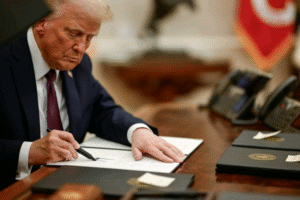
WASHINGTON — President Donald J. Trump has signed an executive order dramatically escalating the U.S. commitment to Qatar’s defense, declaring that any armed attack on the Gulf nation’s territory or critical infrastructure will be regarded as a direct threat to the peace and security of the United States.
The move, announced late Wednesday, comes just weeks after an unprecedented Israeli airstrike hit a compound in Doha targeting leaders of the Hamas political bureau.

(President Donald Trump signing the Executive Orders)
The September 9th attack, which failed to kill its top targets but resulted in the deaths of a Qatari security official and several others, has severely strained regional diplomacy and raised profound questions about the security of a key American ally that hosts the largest U.S. military presence in the Middle East.
The full text of the executive order leaves no ambiguity, promising that in the event of an attack, the United States will “take all lawful and appropriate measures, including diplomatic, economic, and, if necessary, military, to defend the interests of the United States and of the State of Qatar.”
The order establishes a security guarantee that, while falling short of a formal mutual defense treaty, is the most forceful public assurance of protection the U.S. has extended to a non-NATO Arab nation in decades, effectively treating a military strike on Qatar as a potential act of war against Washington.
The decision follows weeks of high-stakes diplomatic maneuvering sparked by the Israeli strike on Doha. Qatar has long served as an indispensable, if often criticized, intermediary between the West, Israel, and militant groups like Hamas, hosting the group’s political office at the request of the U.S. to facilitate communication and cease-fire talks.
The attack occurred while Hamas officials were reportedly meeting to discuss a U.S.-backed proposal for a pause in the war in Gaza, instantly complicating the fragile diplomacy.
Qatari officials condemned the strike as a violation of their sovereignty and an act of “state terror,” with some regional leaders questioning Doha’s continued ability to mediate effectively.
For President Trump, the executive order is a powerful signal aimed at stabilizing a critical partnership. Qatar is home to Al Udeid Air Base, the forward headquarters for U.S. Central Command (CENTCOM), housing thousands of American troops and operating as the central hub for U.S. air operations across the region.
The security of this base, and the stability of the host nation, are paramount to American interests.
An Ally Caught in the Crosshairs
The executive order’s language is particularly salient given that the recent threat to Qatar’s sovereignty came from Israel, a long-standing American ally. Following the Doha strike, Israeli Prime Minister Benjamin Netanyahu reportedly conveyed regret to Qatari Prime Minister Sheikh Mohammed bin Abdulrahman al-Thani for the loss of a Qatari official.
The U.S. announcement coincided with Prime Minister Netanyahu’s visit to Washington this week.
The timing has been interpreted by analysts as an attempt by the Trump administration to reassert American diplomatic leadership and provide a clear red line following the Israeli operation, which reportedly proceeded despite last-minute warnings from the White House.
The executive order stops short of naming a potential aggressor, but its content—specifically the pledge of potential military action—is widely viewed as a clear deterrent message to all regional actors, including Israel and Iran, both of whom have interests that clash in the small, energy-rich peninsula.
For Qatar, which was designated a major non-NATO ally under the previous administration, the executive order is a major diplomatic victory, cementing its position as a central pillar of U.S. security architecture in the Middle East and providing a powerful shield against future attempts to undermine its sovereignty or its diplomatic role.
The commitment, however, now binds the U.S. more closely than ever to the defense of a nation that continues to maintain complex, and sometimes contradictory, relationships across the geopolitical spectrum.





